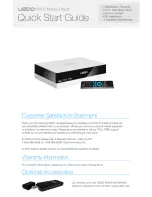
A
B O U T
L
I N K
I
N T E G R I T Y
During normal operation, link integrity pulses are transmitted by all point-to-
point Ethernet devices. When an Black Box media converter receives valid link
pulses, it knows that the device to which it is connected is up and sending puls-
es, and that the copper or fiber cable coming from that device is intact. The
appropriate “LINK” LED is lit to indicate this. The Black Box media converter
also sends out link pulses from its copper and fiber transmitters, but normally
has no way of knowing whether the cable to the other device is intact and the
link pulses are reaching the other end.
FiberAlert
and
LinkLoss
allow this infor-
mation to be obtained from the fiber, even when physical access to a remote
device (and its link integrity LED) is not available. (See below for explanation
of features, see page 4 for using the features in a typical application).
W
H A T
I
S
F X L
I N K
L
O S S
?
FX LinkLoss
is a troubleshooting feature. When a fault occurs on the fiber seg-
ment of a conversion,
FX LinkLoss
detects the fault and passes this information to
the twisted pair segment. If a media converter is not receiving a fiber link,
FX
LinkLoss
disables the transmitter on the media converter's twisted pair port. This
results in a loss of link on the device connected to the twisted pair port.
W
H A T
I
S
T X L
I N K
L
O S S
?
TX LinkLoss
is another troubleshooting feature. When a fault occurs on the twist-
ed pair segment of a conversion,
TX LinkLoss
detects the fault and passes this infor-
mation to the fiber segment. If a media converter is not receiving a twisted pair
link,
TX LinkLoss
disables the transmitter on the media converter's fiber port. This
results in a loss of link on the device connected to the fiber port.
W
H A T
I
S
F
I B E R
A
L E R T
FiberAlert
minimizes the prob-
lems associated with the loss of one
strand of fiber. If a strand is unavail-
able, the Black Box device at the
receiver end notes the loss of link.
The device will then stop transmit-
ting data and the link signal until a
signal or link pulse is received. The
result is that the link LED on BOTH
sides of the fiber connection will go out indicating a fault somewhere in the fiber
loop. Using
FiberAlert
, a local site administrator is notified of a fault and can quick-
ly determine where a cable fault is located.
Installation Troubleshooting
•
During installation, first test the fiber and twisted pair connections with all trou-
bleshooting features disabled, then enable these features, if desired, just before
final installation. This will reduce the features’ interference with testing.
•
When working with units where the features cannot be disabled, you must
establish BOTH your twisted pair and fiber connections before the link
LEDs will light!
•
To test a media converter by itself, first make sure you have an appropriate
fiber patch cable, then follow these steps to test:
SStteepp 11::
Connect the media converter to the twisted pair
device with a twisted pair cable.
SStteepp 22::
Loop a single strand of fiber from the transmit port to
the receive port of your media converter.
SStteepp 33::
Verify that you have both twisted pair and fiber link
(see LEDs, below) on your media converter.
•
Make sure to use the appropriate twisted pair cable, and have the
crossover/pass-through switch set correctly, if your media converter does
not include
AutoCross
.
• If using a high powered device (which is designed for long distance
installations) for a short distance installation, the fiber transmitters
may overdrive the receivers and cause data loss. If this is the case,
you may need to add an optical attenuator to your connection.
Please contact Black Box for more information.
General Information
Order toll-free in the U.S.:
Call 877-877-BBOX (outside U.S. call 724-746-5500)
FREE technical support, 24 hours a day, 7 days a week:
Call:
724-746-5500 or
Fax:
724-746-0746
Mail order:
Black Box Corporation, 1000 Park Drive, Lawrence, PA 15055-1018
Web site:
www.blackbox.com
E-mail:
S
P E C I F I C A T I O N S
Environmental
Operating Temperature: 32° - 122° F (0° - 50° C)
Storage Temperature: 0° - 160° F (-20° - 70° C)
Humidity: 5 - 95% (non-condensing)
Power
AC Input Load: 100-240VAC ±10%, 50/60 Hz, 1A
Heat generated: 51 BTU/hr.
3
6





















